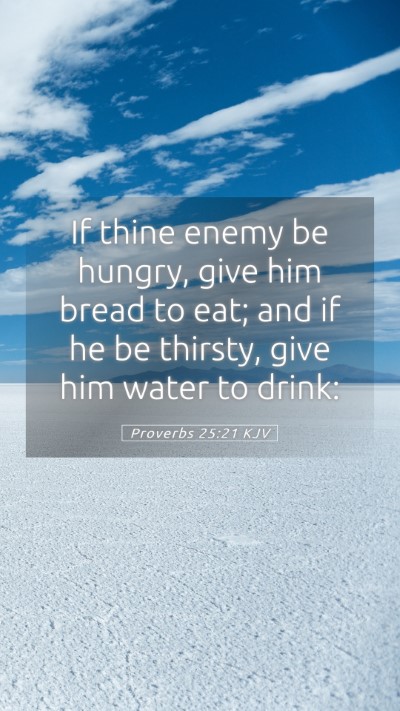Understanding Proverbs 25:21
Proverbs 25:21 states, "If your enemy is hungry, give him bread to eat; and if he is thirsty, give him water to drink." This verse presents profound insights into the nature of compassion and the transformative power of kindness, especially toward those we might consider adversaries. Let us delve into the bible verse meanings and interpretations from various public domain commentaries.
Overview of the Verse
This verse encourages us to respond to our enemies with generosity rather than hostility. It challenges natural instincts to retaliate and instead invites us to practice grace, which can lead to positive outcomes in our relationships.
Commentary Insights
Matthew Henry’s Commentary
Matthew Henry emphasizes the ethical obligation of showing kindness to one’s enemies as a reflection of God’s mercy. He notes that such actions can lead to a change in the enemy's heart, potentially leading them to repentance and reconciliation. Henry suggests that the act of kindness is a form of spiritual victory, which highlights the importance of overcoming evil with good.
Albert Barnes’ Notes
Albert Barnes expounds on the principle of returning good for evil. He articulates that acts of kindness, especially when undeserved, can shame the adversary. Barnes notes the biblical precedent for this principle in Romans 12:20, where we are reminded that responding with generosity can ‘heap coals of fire’ on the head of our foes. This metaphor implies that it may lead enemies to a place of shame, leading to reflection on their actions.
Adam Clarke’s Commentary
Adam Clarke approaches the verse from a practical standpoint, suggesting that providing for one’s enemies can alter their perspective. He highlights that the act may disarm animosity and create a pathway for understanding. Clarke encourages believers to display a spirit of love, demonstrating a higher moral standard that differentiates them from the common reactions of society.
Thematic Analysis
- Compassion and Mercy: The verse promotes compassion even toward those who may wish us harm, pointing to an ideal of unconditional love.
- Overcoming Hostility: It speaks to the strength found in love and generosity, suggesting that these attitudes can break cycles of conflict.
- Spiritual Reflection: This verse prompts self-examination, as believers are called to reflect God’s nature through their actions.
Practical Applications in Daily Life
In practicing the wisdom of Proverbs 25:21, we can challenge ourselves on how we treat those who oppose us. Here are some bible study insights and practical applications:
- When faced with conflict, ask how you can respond with kindness instead of retaliation.
- Consider practical ways to serve those who may be difficult to love; provide for their needs when possible.
- Reflect on God’s grace towards us, and extend that grace to others.
Related Scripture Cross References
- Romans 12:20 - "Therefore if your enemy is hungry, feed him; if he is thirsty, give him a drink."
- Matthew 5:44 - "But I say to you, Love your enemies and pray for those who persecute you."
- Luke 6:27 - "But I say to you who hear: Love your enemies, do good to those who hate you."
Conclusion
Proverbs 25:21 serves as a profound reminder of the transformative power of love over enmity. Engaging with this scripture analysis invites us to embody the values of forgiveness and generosity, leading to possible reconciliation and peace. As we explore the meaning of Bible verses and incorporate these teachings into our lives, we discover a pathway to spiritual growth and deeper understanding of God’s purposes in our relationships.
Further Study and Reflection
For those interested in more in-depth bible study lessons, consider joining a bible study group or utilizing bible study tools available online. Exploring the context and application of verses can provide a richer understanding of Scripture and inform how we live according to God’s word.


